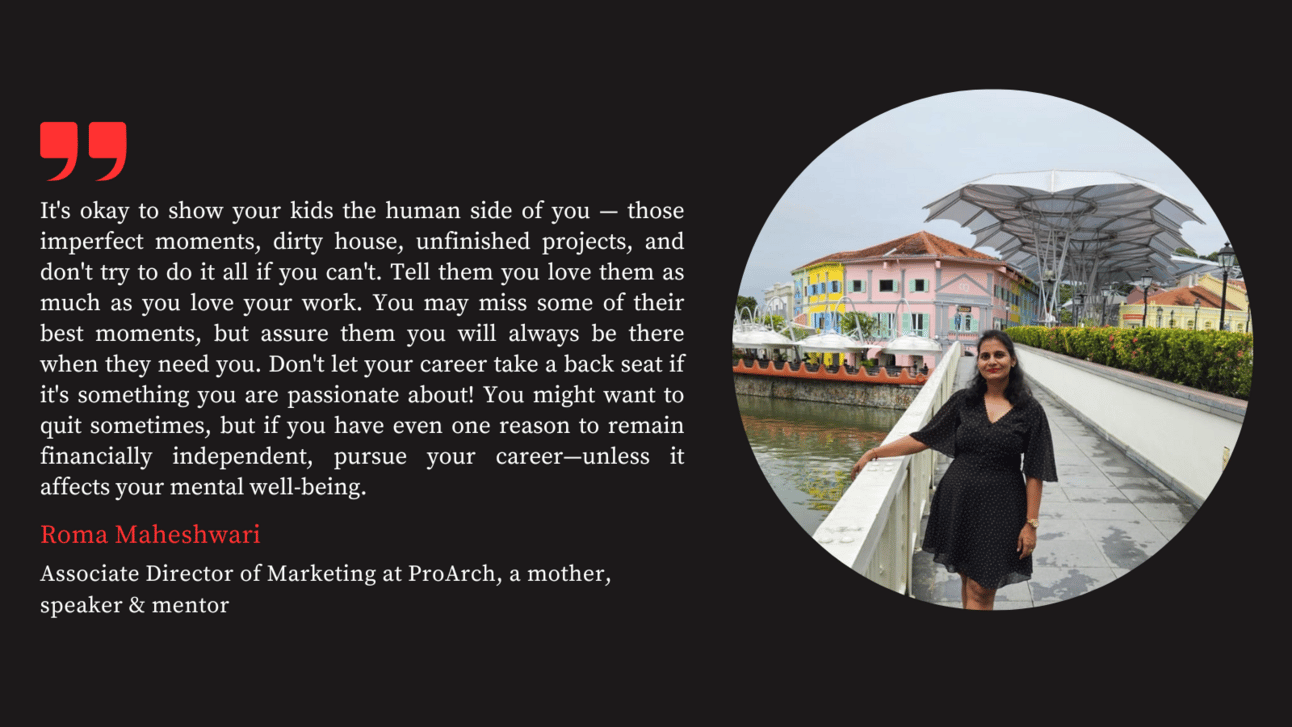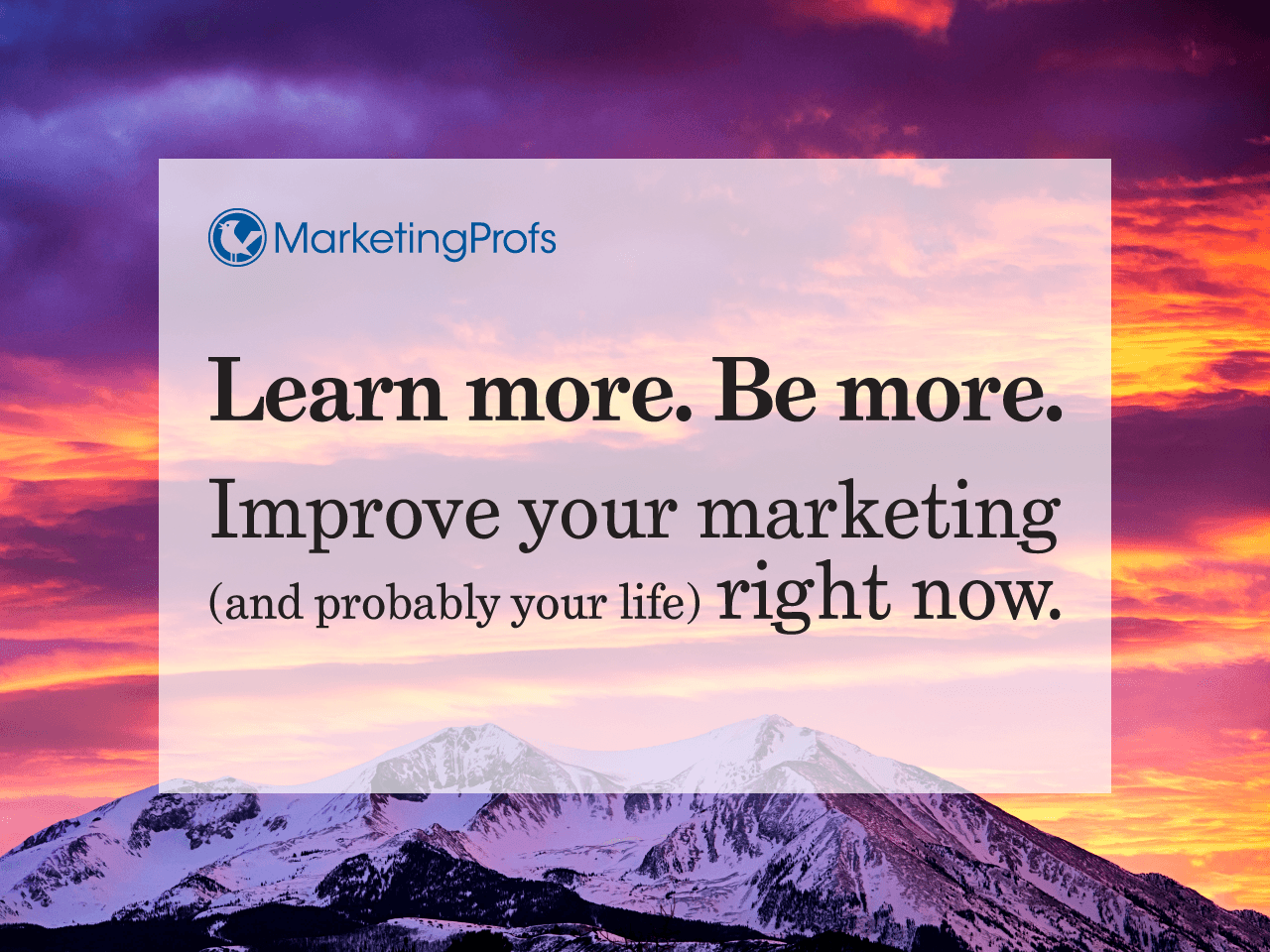- She Got You!
- Posts
- Show your kids your human side!
Show your kids your human side!
Says Roma Maheshwari, Associate Marketing Director at ProArch

Hello! 👋
New subscribers, welcome!
In She Got You, I feature conversations with women professionals from diverse backgrounds and talk about what matters to us: women and the future of work for women. ✨
In today’s edition, I share my conversation with Roma Maheshwari, Associate Director of Marketing at ProArch, mother to Seerat and a fitness enthusiast. Roma is quite vocal about women’s issues and how women drop out of the workforce due to a lack of support, and she shares her opinions on LinkedIn.
It’s one of the major things we talk about. So, without further ado, let’s find out how she’s got you. 👇

Sunaina: Please tell me about yourself and what you do.
Roma: I was born and raised in Rajasthan. I studied biotechnology at Mohanlal Sukhadia University, Udaipur, and I have an MBA from Som-Lalit Management College, Ahmedabad.
My first job was as a management trainee in the clean energy segment at a pharmaceutical company, where I handled website content, product launches, and sales collaterals. It was a tremendous learning experience regarding how Indian markets work. I enjoyed diving into campaigns, audience engagement, social media, and analytics and realised content is my game.
I write a lot, especially about AI in marketing; I'm witnessing firsthand how it's transforming a marketer's life, and early adopters will have a competitive advantage.
My mother has considerably influenced my life. I inherited her habit of being organised and planning ahead. These habits precede how I carry myself and act at home, work, and in life. Marriage has led me to Hyderabad, and the city has been good wrt people, career opportunities, and life.
Sunaina: Who is Roma outside work?
Roma: I'm an introvert, a mom of a three-year-old, a massive fiction reader, and a traveller. Since my daughter's birth, I've been interested in reading books on child psychology, gentle parenting, and kids.
Right now, I'm reading Sudha Murthy's Three Thousand Stitches, and it inspires me subtly — and in many ways.
Sunaina: Right! A marketer can't always step away from being online, right? How do you manage that?
Roma: I'm disciplined and usually stick to my routine; I limit my work to my laptop and stay away from email after work hours. I understand the consequences of storing too much — especially unwanted information — so I'm mindful of my routine and set up DND alerts. I'm an early riser and do deep work in the first hours of the day. Fitness is an integral part of my lifestyle, so I hit the gym five days every week.
I use the Zen Mode app, which raises an alarm if I use my phone during DND. That helps!
We also want our daughter to avoid becoming habituated to screens at this age, so we try to spend time outdoors.
Sunaina: People say a woman's career changes when she becomes a mom. Has it changed for you?
Roma: Of course! Pregnancy changes you in several ways; your hormones go for a toss, and I've experienced this. Although I'm active and eat healthy, I developed gestational diabetes, which surprised my friends and family. But, hormonal changes do affect a woman's body and mess up the brain, despite a healthy lifestyle.
But can you still be as productive? You can maintain it if you plan your days and put yourself, your baby, and the family through a routine. I'm glad I was pregnant during COVID-19 because we were home and could manage home and work. Pregnancy changes you as a person — especially if you enjoy meeting friends and going out but come from a nuclear family. Several things take a backseat when you have a toddler at home.
I have one piece of advice: If spending time with kids brings more joy, especially in the long term, do that. But don't think of leaving your job to devote your time to kids; there's a lot of help available these days — and even daycare centres. So make a conscious choice.
Sunaina: Has gender ever been a disadvantage for you at work?
Roma: Yes! And it's not always about pay parity or promotions. It's about diverse subtle things, you know? Take mansplaining, for instance; Men who don't work in marketing would try to teach me about it. I’ve started calling it out and telling people I know my job.
Gender discrimination comes in so many forms, and you tend to experience it, particularly during maternity. You could be leading a team or product before you take off on maternity leave, but when you're back, several organisations don't give you significant tasks. I felt there were unsaid concerns around me taking bigger responsibilities in the last organisation — half of them because of gender and probably the other half because I was a new mother. Having a baby doesn't change my intellect or skillset, right?
I noticed that the C-suite usually prefers having people at their beck and call, but women maintain boundaries. Perhaps a male marketer can get on a 3 am call, but a female marketer (also a breastfeeding mom) cannot. Physiologically, we're different from men; companies should give their female leaders an advantage. Give them flexible work hours, hybrid work policies or work-from-home whenever required.
I'm vocal about these things because a woman's journey from a tier-2 or tier-3 town to a city is long, different, and quite unlike a man's career. The journeys are distinct, and women need more support. Because of the lack thereof, they drop out of the workforce.
Sunaina: A few women said they got fired during maternity leave despite great hikes and performance reviews.
Roma: I'm sure! Dealing with a layoff during your maternity is the worst.
Postpartum depression is real and requires more conversations around it. I've experienced it — you don't understand why you cry for days. Unlike what they show in movies, you don't bond with your baby right from birth; you put in effort to build that bond, all the while dealing with injuries, weakness or C-section emotions. Imagine your employer leaving you then!
Women already take maternity leave with apprehension and uncertainty about job security. Women at the top should work towards bringing more women to the top and build such policies, too.
I may digress, but look at any company's website, and you'll find the top leadership full of men; there will be one female leader, and that too in marketing or HR. Why are there no women in legal, sales or engineering? It's not because there's a talent shortage but because someone dropped out of the system due to a lack of support or female-friendly policies.
When women tell me they're quitting, citing reasons like marriage or in-laws forbidding them to work, I ask them to think twice because they shouldn't fight or ask for basic things. There's a Facebook group for working mothers in Hyderabad, and you'll only read horrifying stories about women who, unfortunately, do everything alone with minimal support from partners or families. These things happen because our system isn't women-friendly, and gender bias won't vanish unless we consciously fix it at every step.
Sunaina: 100 per cent! Coming back to AI, you talk a lot about it. How did you transform from a traditional marketer to an AI-led marketer?
Roma: It's been an organic transition because, as marketers, we use many tools that already come with AI capabilities. But you’ll get redundant if you don't learn the art of prompting, identify areas where AI can help you scale, or have policies for teams to use AI.
Marketers using AI can run six campaigns yearly, while those not using AI may not run even two. We've seen the first-hand effects in content production, repurposing, and generating A/B variants for campaigns—figuring out these things takes less time, thanks to AI. I realised I had to make this shift to avoid getting left behind. I began listening to podcasts and reading about how marketers use AI to build customer funnels or user personas.
This whole 'AI will replace you' debate has to end — and it will only if we make AI our companion and learn the latest tools in CRM, SEO, outbound campaigns, etc. Otherwise, we can't scale up!
And you know what? So far, we've had T-shaped marketers specialising in one marketing stream. AI will create a new breed of E-shaped marketers who will develop expertise across the spectrum. It could be campaigns, keyword research, design, or content because you can learn and do multiple things by leveraging AI.
Remember how the world thought computers would replace human beings years ago? That didn't happen; they only augmented human capabilities. While replacement won't happen, the size of marketing teams will shrink, and with more AI companies, marketers' jobs will also evolve. New forms of content will also come into the picture. Just look at how gym trainers, HRs, engineers, and diverse professionals are creators now; AI will help us build multiple income streams.
Sunaina: Fo sho! How can traditional marketers make that transition?
Roma: The key is to get comfortable with your current marketing stack, particularly its AI aspects. Second, don't fear losing jobs — we all have different strengths, so learn and upskill on top of that. I aim to be a CMO one day, and if you look at CMOs today, you realise they don't just lead marketing; they also act as communication advisors for the CEO, take products into the market, enable sales teams, and analyse partner relations. They have diverse things to play around with.
I listen to HBR's Ideacast; although it's not a marketing podcast, it gives thinking points, enhances your views, and offers business case studies which foster better communication while talking to your CXOs, customers, and other stakeholders.
I religiously follow Marketing Profs, which is less popular but offers a wide range of AI-related material in multimedia content. Plus, I follow the Content Marketing Institute. I recommend spending an hour learning new things, and I wish I had started this habit earlier, too.
Sunaina: So, you also mentor content marketers. How can one sign up for your mentorship?
Roma: LinkedIn is the best place to contact me as I'm super active there. I write a lot about content marketing and moving into more prominent roles within marketing. I have no criteria for the mentorship because I do this to help those who have been out of the system for a while. I also mentor those who feel stuck in their roles and want to take up bigger roles or those stuck in mid-career marketing roles and need help proving their visibility at work.
While talking to many remarkable women, I realised that despite their knowledge and skillsets, they're underconfident and often adhere to a comfort zone. I was also in a comfort zone in my previous organisation. Although I used to tell my husband I was meant for bigger things and could take up more responsibilities, I didn't go after them. So, I know where these women come from and relate to their concerns.
Sunaina: How did you get out of that comfort zone?
Roma: I got an opportunity to lead marketing at my current company but went back and forth for three months before making a call. I wanted a hybrid work model because we didn't want to leave our baby at home. I was a new mom and thought doing content for some more years would let me work from home.
When I met my hiring manager, I shared my concerns, and he assured we could figure out a hybrid work model. Yet, it wasn't an easy decision. I took my resignation back twice, but my former manager kept it real: he straight-up said I can’t keep taking back my resignation. He asked me to figure out my next role and that I could return if it didn't work out. Because of that cushion, I decided to take a leap of faith. Even if I fail, I'll learn, but touchwood, it's going great.
See that way, I've met and worked with pro-women employers.
As you grow older, you learn to navigate murky situations; when I was younger, I walked out of challenging situations when the right thing to do was stay back, fight, prove them wrong and leave.
Sunaina: Have you been tinkering with any AI tools?
Roma: A lot. ChatGPT, Claude, and Gemini have become my constants, but I've been exploring Opus Clip, a video editing tool that creates short-form content out of long-form videos.
Opus Clip is the go-to tool for podcasters, video editors, agencies, marketers, small business owners, non-profits, skilled workers, and many more, to tell a better story and make a social impact.
— OpusClip (@OpusClip)
11:40 PM • Jun 24, 2023
I'm also tinkering with RivalFlow for SEO. It helps identify your blog rankings and recommends fixes for low-ranking posts. What's incredible is this tool also alerts you when your competitor's posts beat your posts to a higher Google rank.
I check if there's AI support for things I do manually.
Sunaina: That's clever! So, what about the future excites you?
Roma: It's exciting, especially from a marketing perspective. Firstly, marketing is poised for a transformation where the narrative shifts from merely enhancing human productivity to AI performing tasks creatively and understanding context — thanks to unbiased data inputs.
Secondly, marketers and brands adapting to the presence of Gen Z in the workforce. This tech-savvy generation will have different buying patterns, yet the core business goals — cost optimisation, improved services and delivery, better talent acquisition, and innovation — will remain unchanged. With AI providing marketers extra bandwidth, it will be fascinating to see how brands maintain a competitive edge in content, search engine experiences, campaigns, and other channels. And as we speak, AI is changing these channels too.
Personally, I want to spend the next few years travelling and exploring child education. As we all know, pre-primary and primary education shapes a child's personality, and I'd like to contribute to that sector.
So, that was my conversation with Roma. Follow her on LinkedIn to read her insights on marketing and women at work.






Reply